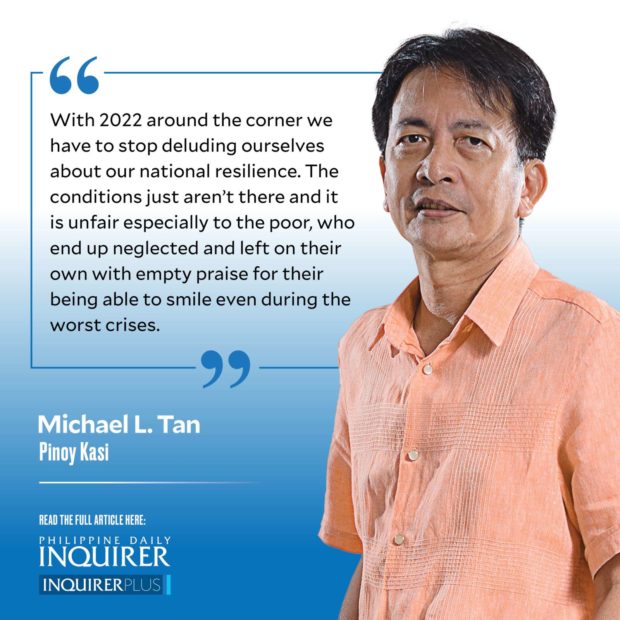I’ve lost count of the number of talks and webinars I’ve given on resilience, usually starting by explaining what it is not (e.g., drinking beer in floodwaters) and then defining it by using the mechanical engineers’ resilience standards for high-rise buildings, which is being able to sway with strong winds or earthquakes and being able to return to normal quickly.
With 2022 around the corner we have to stop deluding ourselves about our national resilience. The conditions just aren’t there and it is unfair especially to the poor, who end up neglected and left on their own with empty praise for their being able to smile even during the worst crises.
Yes, we need to celebrate the season and hope for the best, but I worry that we are not ready, again, for the next COVID-19 surge with the very contagious, albeit less lethal, Omicron variant at our doors.
Start with our schools, with classes in January and with many schools planning to test the waters for face-to-face classes. I’m seeing misplaced priorities, like putting up plastic dividers between students’ desks, and purchasing more disinfecting foot mats that are expensive and yet have no public health value.
We need instead to be working on a system that allows us real-time evaluation of our vulnerabilities in schools and offices, monitoring vaccination status (including boosters), and administering regular antigen tests. Several countries, notably the UK and at least one province in Canada, have even been distributing rapid antigen tests to people with instructions. This allows early detection and quarantine.
I worry we’ll try to catch up only when it’s too late and then we might have a re-run of Pharmally-type corruption that plagued our procurements for masks, shields, and tests.
President Duterte keeps hinting about bringing back those useless face shields (too many unsold stocks?) instead of warning, as several governments are doing now, about the low efficacy of cloth masks and surgical masks, which are too loose-fitting and will be almost totally useless to ward off Omicron. The government advisories now recommend masks like American N95, South Korean KF94, and Chinese KN95, with warnings that there are many fake KN95 ones flooding the world’s markets. In the European Union countries and the United Kingdom, there’s also FFP2 (filtering face piece, level 2).
All of these measures are medical but our problems are ultimately rooted in the lack of a public health system that provides universal health care, no matter what one’s socioeconomic status is. What we have is PhilHealth, which is a weak health insurance system so crippled by corruption that private hospitals are beginning to disengage from the system after waiting so long to be paid PhilHealth arrears.
Add on our social security nets that are so full of holes and you can understand why poverty figures are worsening even as government boasts of low COVID-19 infection rates. As a school administrator, I’ve seen too many students dropping out because of one crisis after another, with inadequate social support to tide them through.
The next year will also be crucial in terms of preparing for more unnatural natural disasters, like Supertyphoon “Odette,” coming about from the worsening climate emergency. As with COVID-19, we need a strong science-based infrastructure—from space satellites to efficient telecommunications, school curricula—to allow early detection and monitoring, build up public awareness, and quick responses to disasters.
Back to social security, the same provisions—unemployment insurance (non-existent in the Philippines), rehabilitation funds especially for small businesses and farms—are needed for all kinds of disasters, whether pandemics, typhoons, earthquakes, to allow resilience.
Finally, a warning about the biggest storm coming in next year: elections. Quiz our candidates on their take on our problems, their vision, their timelines. Watch out for candidates who throw out physical distancing during election mobilizations. Learn from India where, a few months back, campaigning politicians triggered a major COVID-19 surge from their neglect of prevention measures at election rallies.
I don’t want to end on a low note so allow me a take on a cliché: prepare for the worst hoping we have the systems needed for resilience.
I promise a more cheerful column to start off 2022!


